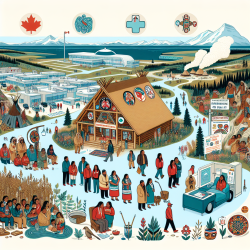Understanding the Impact of Structural Racism on Indigenous Health
Structural racism has long been recognized as a significant determinant of health disparities, particularly among Indigenous populations in Canada. A recent study titled "Structural Racism as an Ecosystem: An Exploratory Study on How Structural Racism Influences Chronic Disease and Health and Wellbeing of First Nations in Canada" sheds light on the complex ways in which structural racism impacts the health and wellbeing of First Nations communities.
Key Findings from the Study
The study identifies six key themes that illustrate how structural racism influences chronic disease and health outcomes for First Nations:
- Multiple and Intersecting Pathways: Structural racism affects health through a web of interconnected systems and inequities.
- Systems of Failure, Harm, and Indifference: Essential service institutions often fail to provide adequate care, leading to negative health outcomes.
- Impacts on Access to Healthcare: First Nations face barriers such as denial of treatment and distrust in the healthcare system.
- Colonial Policies of Structural Deprivation: Historical and current policies continue to shape the social determinants of health.
- Increased Risk Factors for Chronic Disease: Structural racism increases exposure to risk factors associated with poor health.
- Structural Burden Leading to Individual-Level Outcomes: The cumulative burden of racism manifests in physical and mental health challenges.
Practical Steps for Practitioners
Practitioners can play a crucial role in addressing the impacts of structural racism on Indigenous health by:
- Advocating for policy changes that address systemic inequities and improve access to quality healthcare for First Nations communities.
- Implementing culturally sensitive care practices that respect and incorporate Indigenous knowledge and worldviews.
- Engaging in continuous education on the impacts of structural racism and its influence on health outcomes.
- Fostering trust and building relationships with Indigenous communities to improve healthcare access and outcomes.
Encouraging Further Research
While this study provides valuable insights, there is a need for further research to explore the specific impacts of structural racism on different chronic conditions and across diverse Indigenous communities. Such research can help develop targeted interventions to mitigate the effects of structural racism and improve health outcomes.
To read the original research paper, please follow this link: Structural Racism as an Ecosystem: An Exploratory Study on How Structural Racism Influences Chronic Disease and Health and Wellbeing of First Nations in Canada.










